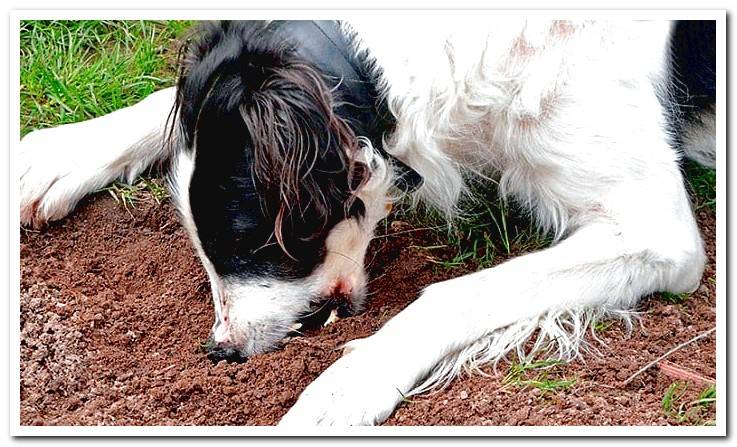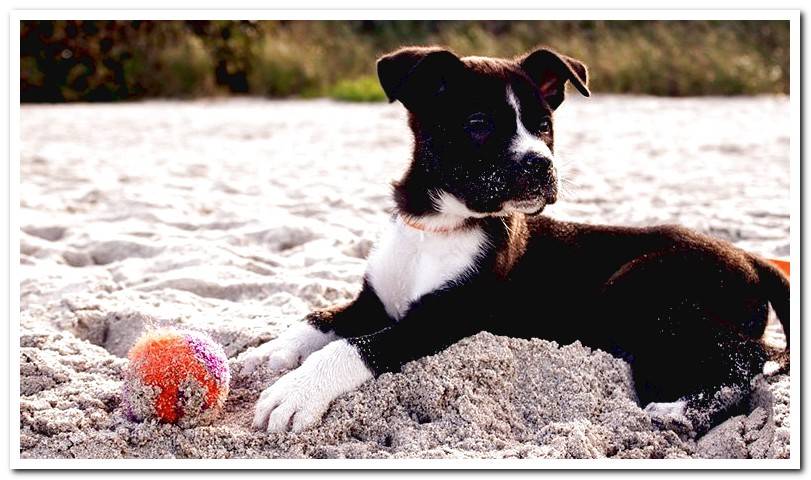
Dogs are gluttons by nature, nothing escapes their attention. One of those quirks can be eating potted soil or garden sand. The causes for which dogs eat dirt can be varied, from boredom to serious illness.
If you want to find out if your dog feeds on earth just because he has discovered a delicious delicacy buried under it or for some problem that requires veterinary attention, keep reading this article from I’m a dog to discover it and put solution.
- You may also like: My dog eats branches and stones Is it bad?
Index of contents
- 1 Causes why a dog eats dirt
- 2 What do I do if my dog has eaten sand or dirt?
- 3 Steps to prevent your dog from feeding on sand
Causes why a dog eats dirt
If you have caught your puppy eating dirt, it is probably because he suffers “itch”, a disorder for which eats things that are not your usual food like dirt, grass or even feces. However, the reasons why this occurs are varied:
- Mineral or vitamin deficiency in your regular diet
- Poisoning / Poisoning
- Parasitic infestation
- Seeking relief from stomach upset
- Boredom and stress
- Wake up call
- Hungry
- Anemia
- Endocrine diseases
- Interest in something buried in the sand
- Curiosity (mainly in puppies)
If you have changed your feed, environment or habits recently or if you have more dogs and they all show the same behavior, they may have a deficiency of minerals in the diet ; or if you have lowered the feed dose because of being overweight, it is probably hunger.
On the other hand, if the persistence in eating dirt is exaggerated or shows any other symptoms, your dog may have suffered poisoning or have intestinal problems. Sporadic intakes of land, especially when you are alone, can be due to boredom or hunger.

What do I do if my dog has eaten sand or dirt?
If your dog ate sand, watch for other symptoms such as bloody diarrhea or stools, decay, vomiting, bruising, etc. In these cases, eating dirt is a consequence of a major stomach problem, so going to the vet on time can save your life.
Eating dirt can be accompanied by solid materials, sharp objects or chemical substances such as fertilizers or insecticides that can harm your dog’s health. So regardless of the reason your dog ate dirt, it deserves a veterinary review.
In any case, if you do not observe any type of emotional or symptomatic alteration in your dog a few hours after the specific experience of eating sand, you can rest easy, surely removing the earth in its next defecation without further significance.
Steps to prevent your dog from feeding on sand
After talking to your vet and finding the problem, the professional will propose several steps to follow to prevent your dog from continuing to eat dirt. However, you can also follow these other ideas additionally to avoid such behavior:
- Make sure that the feed you offer your dog is high in minerals, such as calcium and iron. Otherwise it changes to a I think of quality and nutritious.
- If you have reduced the amount of food your dog is overweight, choose to feed him low calorie instead of low amounts.
- It deworms the dog to prevent earthworms, worms and whipworms from absorbing the essential nutrients for their well-being, known as intestinal parasites.
- Pay more attention to your friend. Entertain him with new toys or longer rides. A tired dog will be less likely to eat sand.
- Keep an eye on him when he’s out in the yard and, if possible, put the pots out of his reach.
- Otherwise, move him away from the area where that pot or sandy area is so appetizing for him and / or reward him when he goes away by himself after your wake-up call.
- Never scold or attack your dog aggressively for any inappropriate behavior. You will only cause trauma!
Just as your dog has been struck by eating dirt, he may also be interested in trying feces, grass, stones, or branches. The causes of these disorders are very similar, so are the steps you can take to avoid it.
